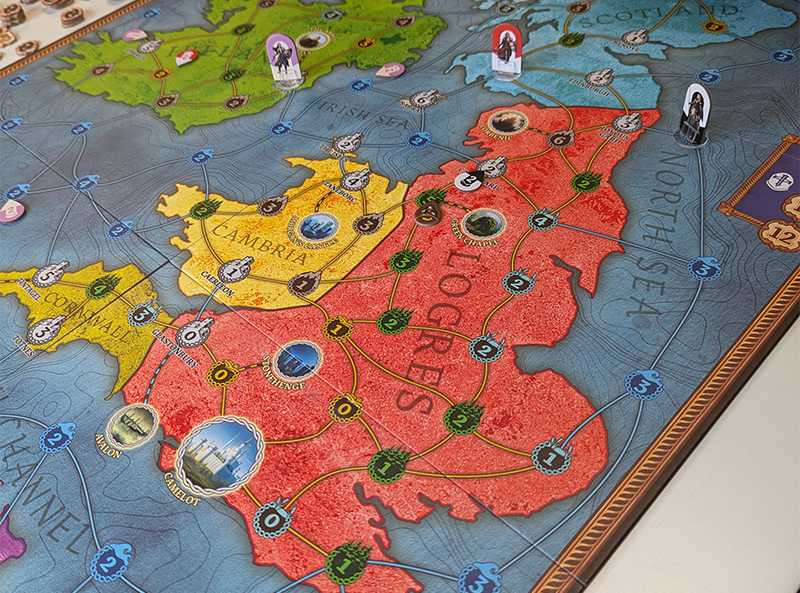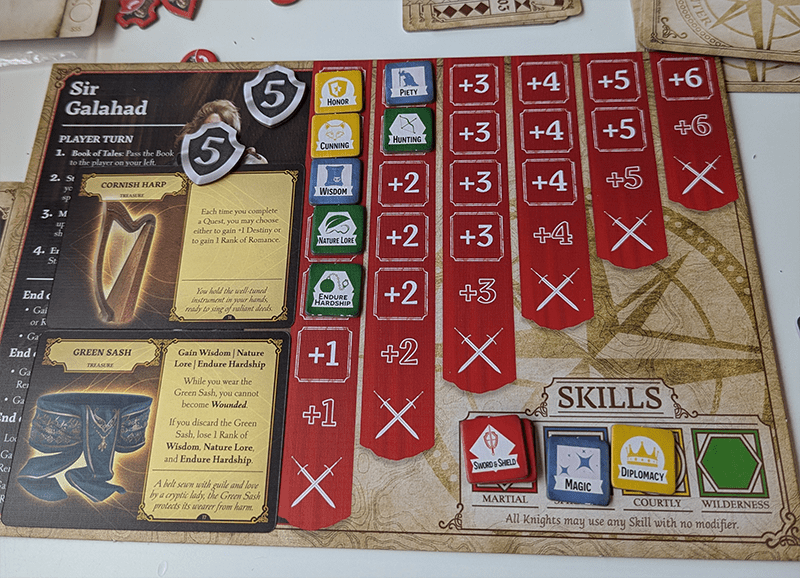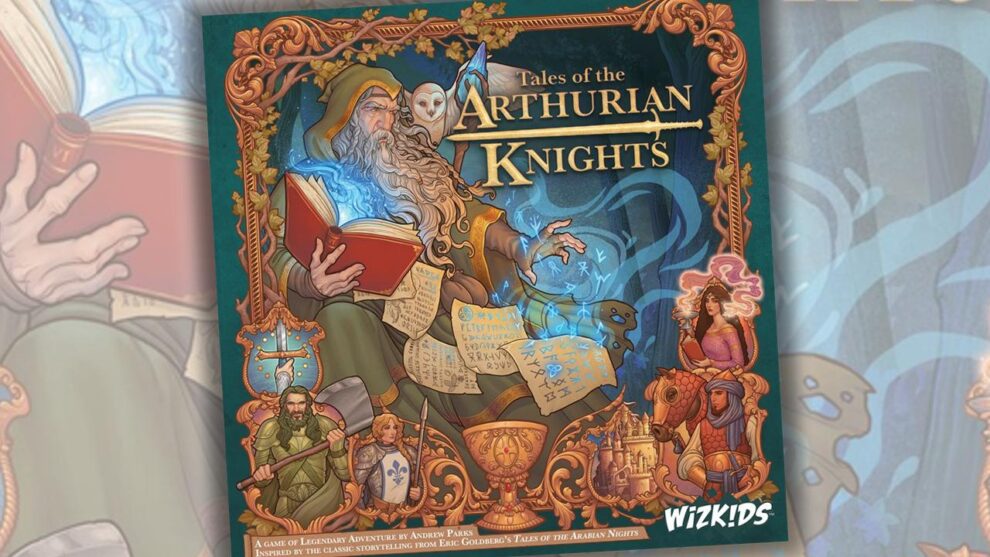Disclosure: Meeple Mountain received a free copy of this product in exchange for an honest, unbiased review. This review is not intended to be an endorsement.
From card games to social deduction, mega games to role-playing adventures, the possibilities of board games might seem endless. However, this wasn’t always the case. In the late 2000s, ‘narrative’ games were far less common than they are today. The concept of app-integrated storytelling or voice-acted narratives wasn’t even an idea at the time. If you wanted to have your story experience in a board game form, options were scarce, and the most well-known at the time was Tales of the Arabian Nights.
As you can tell from the game’s name, it draws inspiration from the classic “One Thousand and One Nights” as players traverse the lands to seek fortune and glory. Instead of complex mechanics, they are told about their situation through a book and the players decide on their response to the situation. To some players, this was a great game, especially for families that want to tell silly stories. For others, like myself, we found the game to be quite random and nonsensical, often overextending its welcome.
When I heard about Tales of the Arthurian Knights, saying I was interested is downplaying my reaction. I loved the idea of Tales of the Arabian Nights, but I was yearning for something that was a bit more consistent and I was quite curious to see fifteen years’ worth of game design wisdom come into fruition. The result? A ten pound narrative book with a board game attached to it.
A Knight’s Tale Unfolds
Tales of the Arthurian Knights puts you in the armor of a Knight of the Round Table. You are tasked to embark on the grandest adventurers, with your achievements measured through destiny points. The game’s narrative unfolds over three ages, each representing an escalation in the plot’s intensity. After going through all three ages, the game ends and whoever has the highest number of destiny points is the winner.
Your character starts the game with three skills, such as Diplomacy, Warfare, or Hunting. Unlike its predecessor, everyone can use any skill and all skill checks are done through a dice roll plus a modifier. Untrained skills have no positive modifiers. Quests are also assigned, giving everyone some direction on the giant map.
From there, the game is extremely simple. You move your Knight around the map, with the number of spaces based on your position on the Renown track. Renown is something you earn through your adventures, and the higher you are on the track, the more you move. Since the game has a round limit, you want to move up on the Renown track as quickly as possible. Quests in this game are location based, so moving more spaces means more quests get completed.
After moving into a location, you draw a card from a deck. Sometimes you will meet a person, an event happens, or you gain access to a Place of Power. Whatever the result, you get a four-digit number. This number refers to the section in the book that the player to your left reads to you.

Swords, Stories, and Skill Checks
Each passage presents you with a unique situation, offering multiple choices for your response. Your selected action triggers a skill check related to that choice. For instance, if you’re facing an impending siege, your “Warfare” skill would likely come into play. Whether you succeed or fail in your check, there’s usually some reward. This system ensures that every decision contributes to your character’s story, regardless of the immediate result.
Successful actions typically earn you destiny points and skill improvements. Less frequently, you might acquire status effects or treasure. While all treasure cards offer benefits, status effects can be a mixed bag. You might receive a positive effect like “Blessed,” or negative effects like “Imprisoned” or “Obsessed,” causing problems for future turns. On rare occasions, you might obtain a numbered Story token, potentially unlocking a continuing narrative thread that spans multiple rounds, adding layers to your knight’s personal tale.
Otherwise, that’s it. Move to a location, get a four-digit number, read the scenario, make a choice, roll the die, and repeat. Tales of the Arthurian Knights doesn’t pretend to be innovative and to be upfront, doesn’t need to. We have decades of data to show that players like to engage in situations with simple choices. If you look at Japan, visual novels are quite popular there. In the West, we have the Choose Your Own Adventures book series and for those who want some RPG flavor, the Fighting Fantasy series. That’s not too much of a surprise, considering us human beings love stories, even when it’s gamified.
Going back to Tales of the Arthurian Knights, this is perhaps the most accessible narrative board game I have ever come across. Everything makes sense and is extremely easy to explain with an intuitive feedback loop. For this review, I’ve played this game with a variety of players from those new to board games to the vets, and all of them came to a similar conclusion as mine: This game is great at what it does.
Understanding the Landscape
And I want to highlight that last part. This is not a strategy game at all. The board and cards all act as vassals to the narrative book. Do not, under any circumstances, expect a serious competitive game out of this. Tales of the Arthurian Knights is there to tell stories, not much different than a group of friends huddling around a campfire during the night.
What makes Tales of the Arthurian Knights works so well in contrast to other narrative-driven games is its unpretentious approach. Some games, like Abomination: The Heir of Frankenstein and Above & Below, attempt to marry storytelling with strategic board gaming but often felt like the world’s loudest screeching halt whenever the narrative part comes in. While app-based games can effectively deliver stories, there’s a unique charm in physically handling a giant book. The tactile experience of flipping pulp pages between your fingertips is part of that immersion.
A standout feature in Tales of the Arthurian Knights is its approach to failure. Most adventure board games often have a binary “success” or “failure” with failure leading to halting or reversing progress. In Tales of the Arthurian Knights, players always progress forward no matter what, leading to a consistent progression of their character’s skills. This steady progression, combined with the game constantly washing you in rich narrative and evocative writing, creates an engaging experience. It allows players to become emotionally invested in their Knight’s journey, regardless of the outcomes, as each turn unveils a new chapter in their personal saga.
Now this game would easily crumble if the writing was terrible, except that isn’t the case. In fact, this is perhaps one of the best pieces of writing I’ve come across in a long time in not just tabletop, but gaming overall. Every passage bodyslams you into an interesting situation and the pacing of these vignettes could serve as a masterclass in narrative design. If there’s a minor flaw, it’s the occasional overload of character names and some lengthier passages, particularly for the crucial Places of Power. These moments can sometimes feel drawn out. However, these are small quibbles in what is otherwise a richly rewarding narrative experience that’s well worth taking pleasure in.
In contrast to its Arabian predecessor, Tales of the Arthurian Knights excels through its cohesive format. While Tales of the Arabian Nights offered intriguing and fantastical scenarios, the outcomes and consequences often felt disjointed and overly chaotic. This inconsistency made it challenging for me to form a genuine connection with my character’s journey.
Tales of the Arthurian Knights, however, strikes a better balance, delivering engaging narratives with a more sensible and subdued approach. Throw in constant progression where even failure gives some reward and it’s hard to not get tied into the story. Because of this format, it allows me to forge a stronger emotional bond with my knight and their development throughout the game.

Solo or Side by Side
The game’s versatility is nearly as impressive as its writing. While I’ve focused on the competitive mode, it also has solo and cooperative modes. I’ve only done solo once, but the idea is similar to the cooperative mode. Both challenge you to deplete a shared pool of destiny points within a set number of rounds. This might seem odd for a game built on random scenarios and choices, but it actually tests your grasp of the game’s setting and lore. For instance, if you attempt to communicate with an animal without the Nature Lore skill and fail, that’s on you, not the game.
I do have to heed a particular warning, as this game can be quite lengthy. On the box, it says 45 minutes per player, and it is accurate. This means that if you decide to give this a go with three other friends, you will have plenty of downtime between your stories and the game will easily surpass the three-hour mark. I’ll admit I’ve certainly enjoyed my experiences even at a full player count, but not every player I’ve wrangled for this review held the same viewpoints.
Tales of the Arthurian Knights is a remarkable narrative-driven experience that fully embraces the art of storytelling in board games. It shines in its ability to draw players into a world of knights, quests, and personal sagas with well-crafted writing. While I cannot ignore its length and sometimes slow pacing, some pain is necessary for the greater result. Like any good story, it is about the journey—one that’s filled with memorable moments, both grand and small, that will linger long after the game ends.











